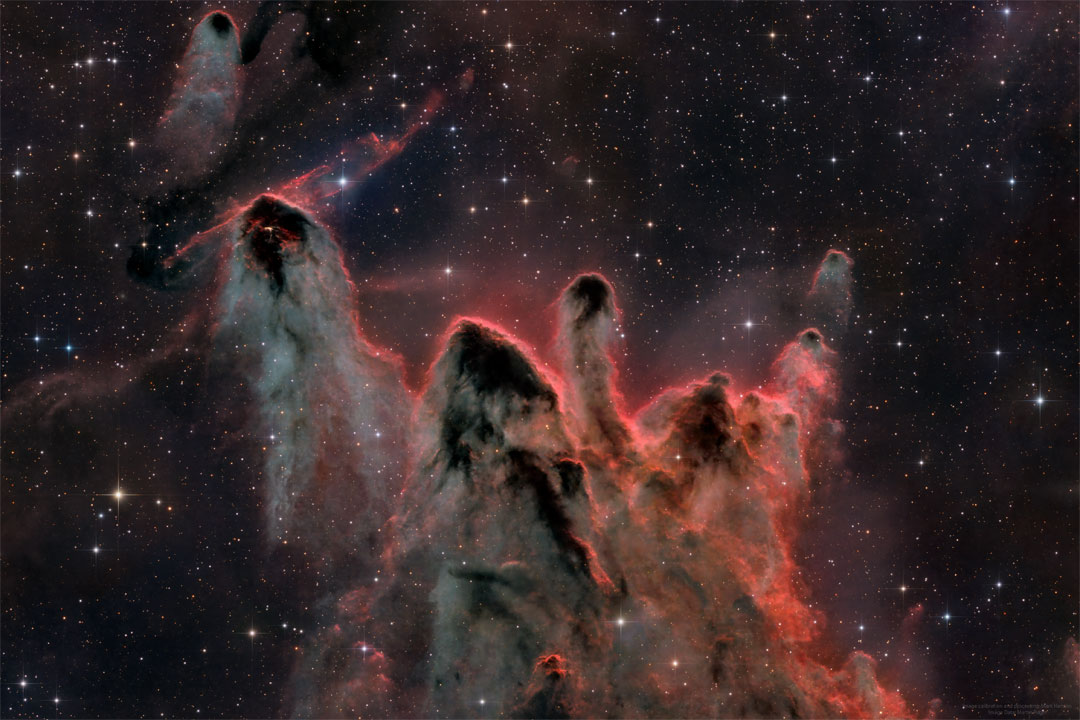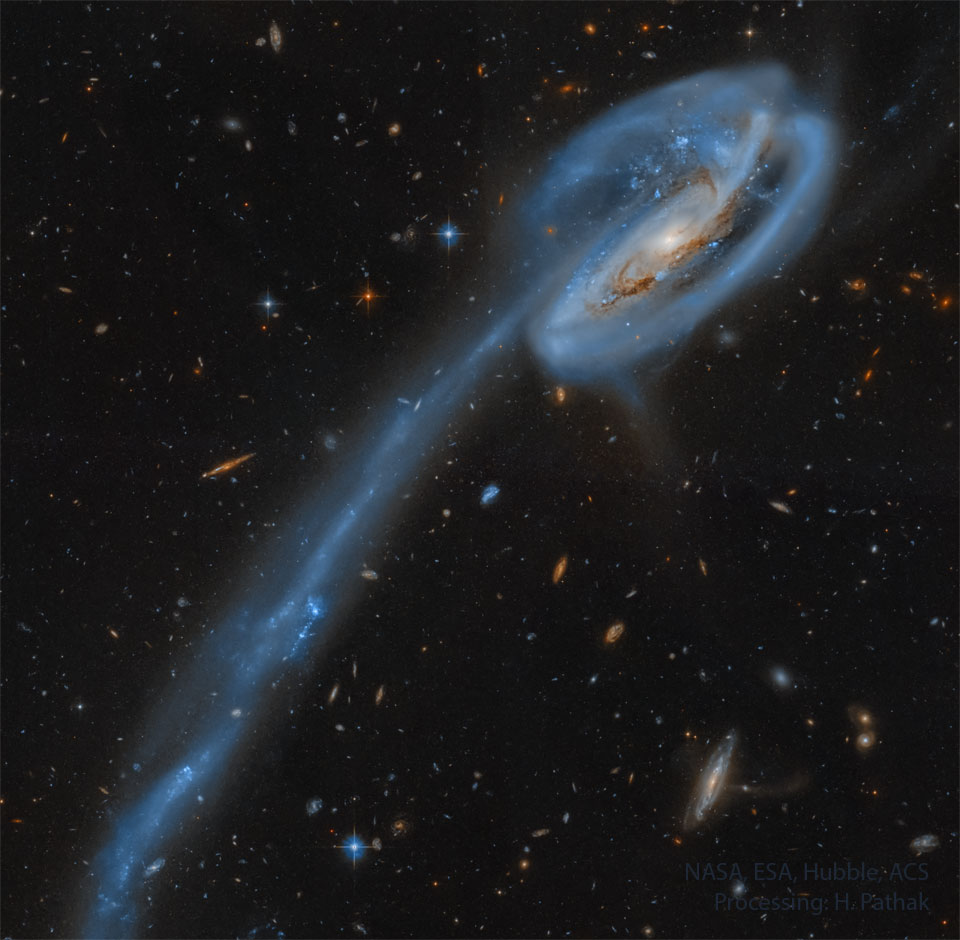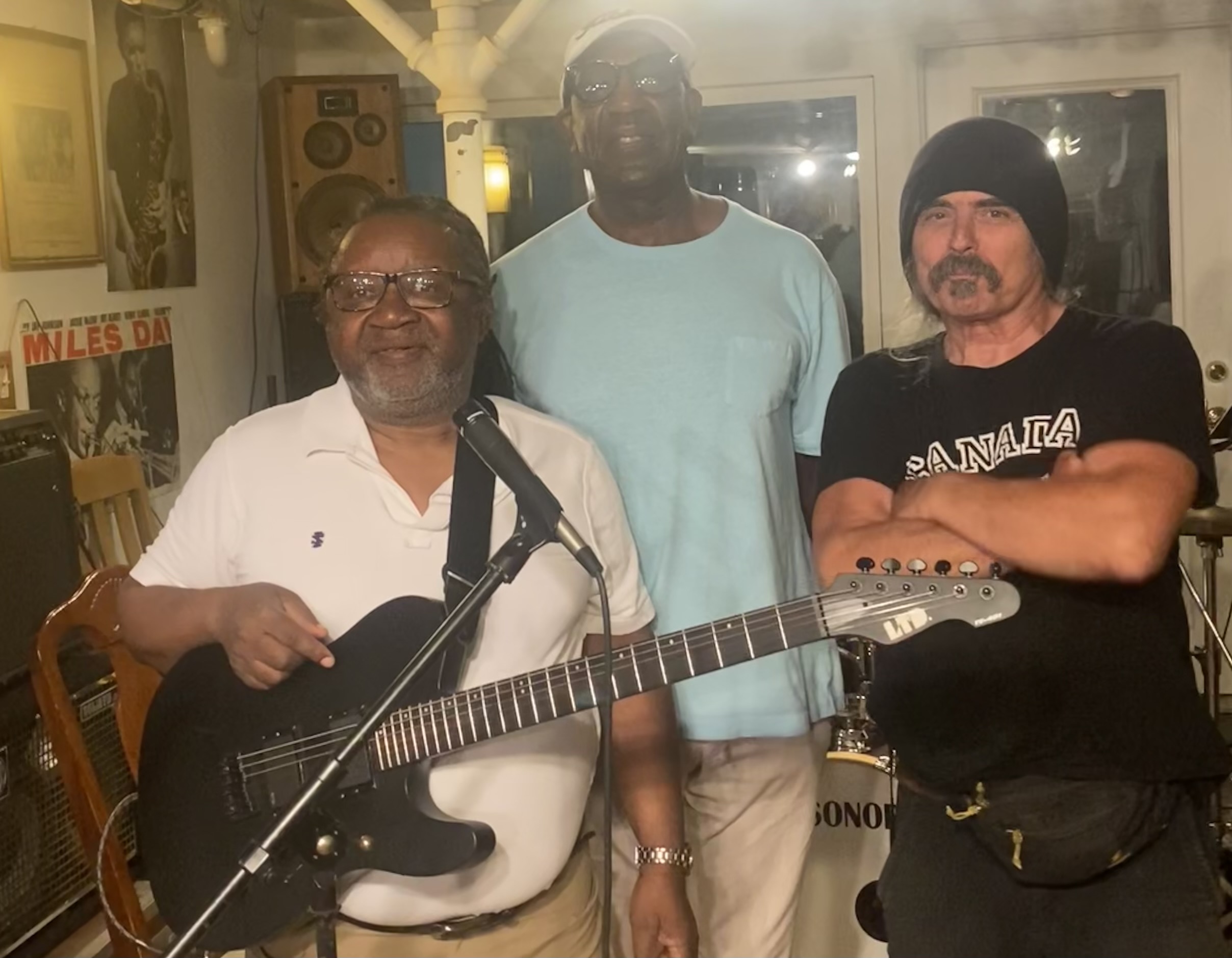Blog
Bright-rimmed, flowing shapes gather near the center of this rich starfield toward the borders of the nautical southern constellations Pupis and Vela. Composed of interstellar gas and dust, the grouping of light-year sized cometary globules is about 1300 light-years distant. Energetic ultraviolet light from nearby hot stars has molded the globules and ionized their bright rims. The globules also stream away from the Vela supernova remnant which may have influenced their swept-back shapes. Within them, cores of cold gas and dust are likely collapsing to form low mass stars, whose formation will ultimately cause the globules to disperse. In fact, cometary globule CG 30 (on the upper left) sports a small reddish glow near its head, a telltale sign of energetic jets from a star in the early stages of formation.

Chico Freeman (born Earl Lavon Freeman Jr.; July 17, 1949) is a modern jazz tenor saxophonist and trumpeter and son of jazz saxophonist Von Freeman. He began recording as lead musician in 1976 with Morning Prayer, won the New York Jazz Award in 1979 and earned the Stereo Review Record of the Year in 1981 for his album The Outside Within.
He was born in Chicago, Illinois, the son of jazz tenor saxophonist Von Freeman. His uncle George Freeman played the guitar, and his uncle Bruz Freeman played the drums.
more...Benjamin Alexander Riley Jr. (July 17, 1933 – November 18, 2017) was an American jazz drummer known for his work with Thelonious Monk, as well as Alice Coltrane, Stan Getz, Eddie “Lockjaw” Davis, Ahmad Jamal, and as a member of the group Sphere. During the 1970s and 1980s he was a member of the New York Jazz Quartet.
Benjamin Alexander Riley Jr. was born in Savannah, Georgia, on July 17, 1933, and at the age of four moved with his family to New York City.
Riley performed with Randy Weston, Sonny Stitt, Stan Getz, Junior Mance, Kenny Burrell, Eddie “Lockjaw” Davis–Johnny Griffin (1960–1962), Ahmad Jamal, Billy Taylor, and Ray Bryant. He then spent 1964 to 1967 in Thelonious Monk‘s quartet. After Monk, he played with Alice Coltrane (intermittently between 1968 and 1975), Ron Carter(1975–1977), Jim Hall (1981), and the bands the New York Jazz Quartet (1970s and 1980s) and Sphere. He also played frequently with pianist Abdullah Ibrahim.
Riley died of lung disease and complications of diabetes in West Islip, New York on November 18, 2017, aged 84.
more...Joseph Albert Morello (July 17, 1928 – March 12, 2011 Springfield, MA) was an American jazz drummer best known for serving as the drummer for pianist Dave Brubeck, as part of the Dave Brubeck Quartet, from 1957 to 1972, including during the quartet’s “classic lineup” from 1958 to 1968, which also included alto saxophonist Paul Desmond and bassist Eugene Wright. Morello’s facility for playing unusual time signatures and rhythms enabled that group to record a series of albums that explored them. The most notable of these was the first in the series, the 1959 album Time Out, which contained the hit songs “Take Five” and “Blue Rondo à la Turk“. In fact, “Take Five”, the album’s biggest hit (and the first jazz single to sell more than one million copies) was specifically written by Desmond as a way to showcase Morello’s ability to play in 5/4time.
Besides playing with Brubeck, Morello also served as an accompanist for other musicians, including Marian McPartland, Tal Farlow and Gary Burton, and recorded his own albums as well. He received numerous accolades during his life, including being named the best drummer by Down Beat magazine five years in a row.
more...Vincent Anthony Guaraldi ( Dellaglio, July 17, 1928 – February 6, 1976) was an American jazz pianist best known for composing music for animated television adaptations of the Peanuts comic strip. His compositions for this series included their signature melody “Linus and Lucy” and the holiday standard “Christmas Time Is Here“. Guaraldi is also known for his performances on piano as a member of Cal Tjader‘s 1950s ensembles and for his own solo career. Guaraldi’s 1962 composition “Cast Your Fate to the Wind” became a radio hit and won a Grammy Award in 1963 for Best Original Jazz Composition. He died of a heart attack on February 6, 1976, at age 47, moments after concluding a nightclub performance in Menlo Park, California. Guaraldi was born in San Francisco’s North Beach area, a place that became very important to his blossoming musical career. Guaraldi died on February 6, 1976, at age 47 after suffering a massive heart attack. The evening before, he had dined at Mendelson’s home and was reportedly not feeling well, complaining of indigestion-like chest discomfort. “He was about to do his first cruise. He’d be able to play Peanuts music on the ship, and he was excited about that. We talked about the cruise and the Peanutsshows, and I said that I didn’t know what the next one would be yet, but that we wouldn’t start until he got back. But he also said he wasn’t feeling well, and had gone to see the doctor. The doctor thought Vince might have a diaphragmatic hernia, and that they might have to deal with it.
more...based on image data from the Hubble Legacy Archive, distant galaxies form a dramatic backdrop for disrupted spiral galaxy Arp 188, the Tadpole Galaxy. The cosmic tadpole is a mere 420 million light-years distant toward the northern constellation of the Dragon (Draco). Its eye-catching tail is about 280 thousand light-years long and features massive, bright blue star clusters. One storygoes that a more compact intruder galaxy crossed in front of Arp 188 – from right to left in this view – and was slung around behind the Tadpole by their gravitational attraction. During the close encounter, tidal forces drew out the spiral galaxy’s stars, gas, and dust forming the spectacular tail. The intruder galaxy itself, estimated to lie about 300 thousand light-years behind the Tadpole, can be seen through foreground spiral arms at the upper right. Following its terrestrial namesake, the Tadpole Galaxy will likely lose its tail as it grows older, the tail’s star clusters forming smaller satellites of the large spiral galaxy.

Desmond Dekker (16 July 1941 – 25 May 2006) was a Jamaican ska, rocksteadyand reggae singer-songwriter and musician. Together with his backing group the Aces(consisting of Wilson James and Easton Barrington Howard), he had one of the earliest international reggae hits with “Israelites” (1968). Other hits include “007 (Shanty Town)” (1967), “It Mek” (1969) and “You Can Get It If You Really Want” (1970).
Desmond Adolphus Dacres was born in Saint Andrew Parish (Greater Kingston), Jamaica, on 16 July 1941. Dekker spent his formative years in Kingston. From a young age he regularly attended the local church with his grandmother and aunt. This early religious upbringing, as well as Dekker’s enjoyment of singing hymns, led to a lifelong religious commitment. Following his mother’s death, he moved to the parish of St. Maryand later to St. Thomas. While at St. Thomas, Dekker embarked on an apprenticeship as a tailor before returning to Kingston, where he became a welder. His workplace singing had drawn the attention of his co-workers, who encouraged him to pursue a career in music.
In 1961 he auditioned for Coxsone Dodd (Studio One) and Duke Reid (Treasure Isle), though neither audition was successful. The unsigned vocalist then auditioned for Leslie Kong‘s Beverley’s record label and was awarded his first recording contract.
more...Rubén Blades Bellido de Luna (born July 16, 1948), known professionally as Rubén Blades
is a Panamanian musician, singer, composer, actor, activist, and politician, performing musically most often in the salsa, and Latin jazz genres. As a songwriter, Blades brought the lyrical sophistication of Central American nueva canción and Cuban nueva trova as well as experimental tempos and politically inspired Son Cubano salsa to his music, creating “thinking persons’ (salsa) dance music”. Blades has written dozens of hit songs, including “Pedro Navaja” and “El Cantante” (which became Héctor Lavoe‘s signature song). He has won twelve Grammy Awards out of 20 nominations and eleven Latin Grammy Awards.
His acting career began in 1983, and has continued, sometimes with several-year breaks to focus on other projects. He has prominent roles in films such as Crossover Dreams (1985), The Milagro Beanfield War (1988), The Super (1991), Predator 2(1990), Color of Night (1994), Safe House (2012), The Counselor (2013) and Hands of Stone (2016), along with three Emmy Award nominations for his performances in The Josephine Baker Story (1991), Crazy from the Heart (1992) and The Maldonado Miracle(2003). He portrayed Daniel Salazar, a main character on the TV series Fear the Walking Dead (2015–2017; 2019–2023).
In 1994, Blades managed to attract 17% of the vote in a failed attempt to win the Panamanian presidency. In September 2004, he was appointed minister of tourism by Panamanian president Martín Torrijos for a five-year term.
He made his debut U.S. with the Pete Rodriguez orchestra in 1970 on his album De Panamá a New York and among his most successful albums are Rubén Blades y Son del Solar… Live!, Amor y Control, Caminando, SALSWING!, Son de Panamá, Tangos, Canciones del Solar de los Aburridos, Buscando América, El Que la Hace la Paga, Escenas, Salsa Big Band, Metiendo Mano! and his famous album Siembra released in 1978. In addition, he has collaborated with different artists such as Usher, Elvis Costello, as a soloist and as a guest Michael Jackson, Luis Miguel, Julio Iglesias, Ricky Martin, Juan Gabriel, Laura Pausini, Shakira, Thalía in the Spanish version of the song “What More Can I Give” written and translated by Blades as “Todo Para Ti“. He has also participated in several productions by different Latino artists such as “Almost Like Praying“, “Color Esperanza 2020“, “Hoy Es Domingo” among other tracks. He also translated into Spanish the track “I Just Can’t Stop Loving You” in the version called “Todo Mi Amor eres Tu” included in Jackson’s anniversary album Bad 25.
more...Callen Radcliffe Tjader Jr. (/ˈdʒeɪdər/ JAY-dər; July 16, 1925 – May 5, 1982) was an American Latin Jazz musician, often described as the most successful non-Latino Latin musician. He explored other jazz idioms, especially small group modern jazz, even as he continued to perform music of Africa, the Caribbean and Latin America.
Tjader played the vibraphone primarily, and was accomplished on the drums, bongos, congas, timbales, and the piano. He worked with many musicians from several cultures. He is often linked to the development of Latin rock and acid jazz. Although fusing Jazz with Latin music is often categorized as “Latin Jazz”, Tjader’s works swung freely between both styles. His Grammy award in 1980 for his album La Onda Va Bien capped off a career that spanned over 40 years.
Callen Radcliffe Tjader Jr. was born July 16, 1925, in St. Louis to touring Swedish American vaudevillians.
more...Bola Sete (born Djalma de Andrade; July 16, 1923 – February 14, 1987) was a Brazilian guitarist known for playing jazz with Vince Guaraldi and Dizzy Gillespie.
Born Djama de Andrade in Rio de Janeiro, Sete was the only son of a family with seven children. His nickname means “Seven Ball”. In snooker, which is fairly popular in Brazil, the seven ball is the only black ball on the table (like the eight ball in pool). Bola got this nickname when he was the only black member of a small jazz group.
Sete’s family were poor and often struggled with finding food. Every member of the family played a musical instrument and would often play together. Sete first began playing music when he found a Cavaquinho in his home. With the help of his Uncle, he taught himself to play and eventually got his own instrument. For Christmas in 1932, he was gifted his first guitar.
more...Monday July 15th 2024 at 2pm Karibuni East African ensemble performing at Redeemer Health & Rehab Center for Seniors in south Minneapolis. African music styles of Rumba, baksimba, mutuashi, Cha Ka Cha and Zouk will be demonstrated and performed.

The galaxy featured in this week’s Hubble Picture of the Week is the dwarf irregular galaxy NGC 5238, located 14.5 million light-years from Earth in the constellation Canes Venatici. Its unexciting, blob-like appearance, resembling more an oversized star cluster than a galaxy, belies a complicated structure which has been the subject of much research by astronomers. Here, the NASA/ESA Hubble Space Telescope is able to pick out the galaxy’s countless stars, as well as its associated globular clusters — the glowing spots both inside and around the galaxy that are swarmed by yet more stars.
NGC 5238 is theorised to have recently — here meaning no more than a billion years ago! — had a close encounter with another galaxy. The evidence for this is the tidal distortions of NGC 5238’s shape, the kind produced by two galaxies pulling on each other as they interact. There’s no nearby galaxy which could have caused this disturbance, so the hypothesis is that the culprit is a smaller satellite galaxy that was devoured by NGC 5238. Traces of the erstwhile galaxy might be found by closely examining the population of stars in NGC 5238, a task for which the Hubble Space Telescope is an astronomer’s best tool. Two tell-tale signs would be groups of stars with properties that look out of place compared to most of the galaxy’s other stars, indicating that they were originally formed in a separate galaxy, or stars that look to have all formed abruptly at around the same time, which would occur during a galactic merger. The data used to make this image will be put to use in testing these predictions.
Despite their small size and unremarkable appearance, it’s not unusual for dwarf galaxies like NGC 5238 to drive our understanding of galaxy formation and evolution. One main theory of galaxy evolution is that galaxies formed ‘bottom-up’ in a hierarchical fashion: star clusters and small galaxies were the first to form out of gas and dark matter, and they gradually were assembled by gravity into galaxy clusters and superclusters, explaining the shape of the very largest structures in the Universe today. A dwarf irregular galaxy like NGC 5238 merging with an even smaller companion is just the type of event that might have begun this process of galaxy assembly in the early Universe. So, it turns out that this tiny galaxy may serve as a test of some of the most fundamental predictions in astrophysics!
[Image Description: A dwarf irregular galaxy. It appears as a cloud of bluish gas, filled with point-like stars that also spread beyond the edge of the gas. A few glowing red clouds sit near its centre. Many other objects can be seen around it: distant galaxies in the background, four-pointed stars in the foreground, and star clusters that are part of the galaxy – shining spots surrounded by more tiny stars.]

Joseph Satriani (born July 15, 1956) is an American rock guitarist, composer, and songwriter. Early in his career he worked as a guitar instructor, with many of his former students achieving fame, including Steve Vai, Larry LaLonde, Rick Hunolt, Kirk Hammett, Andy Timmons, Charlie Hunter, Kevin Cadogan, and Alex Skolnick. Satriani went on to have a successful solo music career, starting in the mid-1980s. He is a 15-time Grammy Award nominee and has sold over ten million albums, making him the bestselling instrumental rock guitarist of all time.
In 1988, Satriani was recruited by Mick Jagger as lead guitarist for his first solo tour.Satriani briefly toured with Deep Purple, joining shortly after another departure of Ritchie Blackmore from the band in November 1993. He has worked with a range of guitarists during the G3 tour, which he founded in 1995. Satriani has been the guitarist for the supergroup Chickenfoot since joining the band in 2008.
Satriani was born in Westbury, New York and is of Italian descent. His paternal grandparents were from Piacenza and Bobbio, while his maternal grandparents were from Bari. He was raised Roman Catholic. He was inspired to play guitar at age 14, after hearing of the death of Jimi Hendrix. Satriani heard the news during football practice, where he then announced to his coach that he was quitting to become a guitarist.
more...Linda Maria Ronstadt (born July 15, 1946) is an American singer who performed and recorded in diverse genres including rock, country, light opera, the Great American Songbook, and Latin music.
Ronstadt has earned 11 Grammy Awards, three American Music Awards, two Academy of Country Music awards, an Emmy Award, and an ALMA Award. Many of her albums have been certified gold, platinum or multiplatinum in the United States and internationally. She has also earned nominations for a Tony Award and a Golden Globeaward. She was awarded the Latin Grammy Lifetime Achievement Award by the Latin Recording Academy in 2011 and also awarded the Grammy Lifetime Achievement Award by the Recording Academy in 2016. She was inducted into the Rock and Roll Hall of Fame in April 2014. On July 28, 2014, she was awarded the National Medal of Arts and Humanities. In 2019, she received a star jointly with Dolly Parton and Emmylou Harris on the Hollywood Walk of Fame for their work as the group Trio. Ronstadt was among five honorees who received the 2019 Kennedy Center Honors for lifetime artistic achievements.
Ronstadt has released 24 studio albums and 15 compilation or greatest hits albums. She charted 38 US Billboard Hot 100 singles. Twenty-one of those singles reached the top 40, ten reached the top 10, and one reached number one (“You’re No Good“). Ronstadt also charted in the UK as two of her duets, “Somewhere Out There” with James Ingram and “Don’t Know Much” with Aaron Neville, peaked at numbers 8 and 2 respectively and the single “Blue Bayou” reached number 35 on the UK Singles Chart. She has charted 36 albums, ten top-10 albums, and three number one albums on the US Billboard albums chart. Ronstadt has lent her voice to over 120 albums, collaborating with artists in many genres, including Dolly Parton, Emmylou Harris, Bette Midler, Billy Eckstine,[21] Frank Zappa, Carla Bley (Escalator Over the Hill), Rosemary Clooney, Flaco Jiménez, Philip Glass, Warren Zevon, Gram Parsons, Neil Young, Paul Simon, Earl Scruggs, Johnny Cash, and Nelson Riddle. Christopher Loudon, of Jazz Times, wrote in 2004 that Ronstadt is “blessed with arguably the most sterling set of pipes of her generation.
more...Joseph Rudolph “Philly Joe” Jones (July 15, 1923 – August 30, 1985) was an American jazz drummer.
As a child, Jones appeared as a featured tap dancer on The Kiddie Show on the Philadelphia radio station WIP. He was in the US Army during World War II.
In 1947 he became the house drummer at Café Society in New York City, where he played with the leading bebop players of the day, including Tadd Dameron. From 1955 to 1958, Jones toured and recorded with Miles Davis Quintet — a band that became known as “The Quintet” (along with Red Garland on piano, John Coltrane on sax, and Paul Chambers on bass). Davis acknowledged that Jones was his favorite drummer, and stated in his autobiography that he would always listen for Jones in other drummers.
From 1958, Jones worked as a leader, but continued to work as a sideman with other musicians, including Bill Evans and Hank Mobley. Evans, like Davis, also openly stated that Jones was his all-time favorite drummer.
more...More Posts
- World Music with Nadya Giga and Their 101 Candles Orchestra
- Daily Roots with Cornell Campbell
- The Cosmos with the Antares
- Charlie Watts Day
- Ahmed Jamal Day
- World Music with Mamady Keita
- Daily Roots with Leroy Smart
- The Cosmos with IC 5332
- Leon “Ndugu” Chancler Day
- James Cotton Day
- Willie Dixon Day
- World Music with Music Maya Aj
- Daily Roots with Horace Andy
- The Cosmos with Trapezium Cluster
- Stanley Clarke Day
- Andrew Hill Day
- World Music with Nico Kasanda
- Daily Roots with Hortense Ellis
- The Cosmos with M24
- Gilberto Gil Day